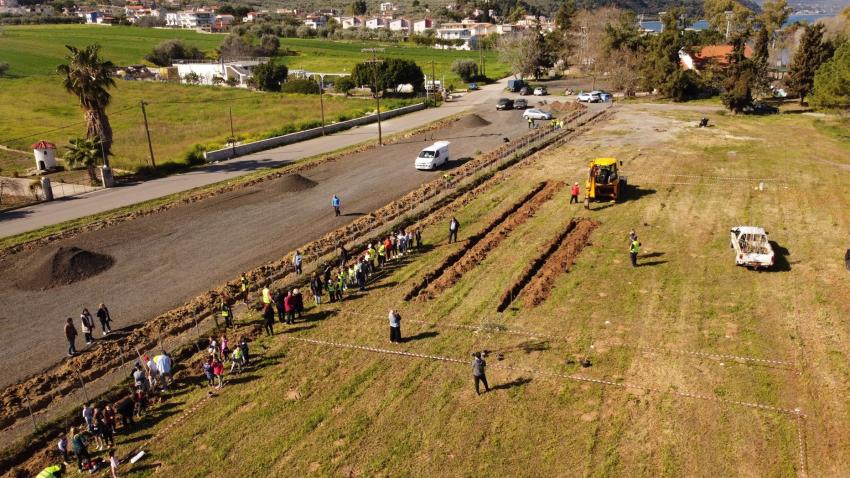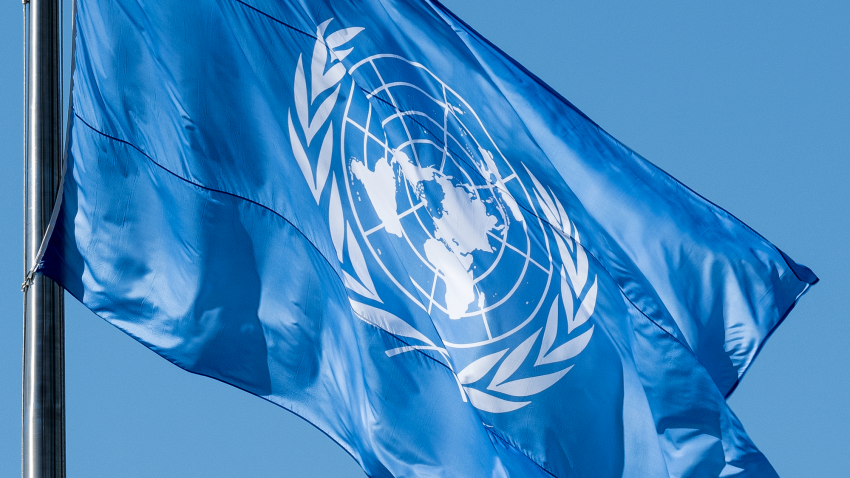“End our war on nature” was Antonio Guterres’s call at the Leaders Summit on Climate convened by President Biden this, April 22 Earth Day morning. Last week we had quoted from the remarks by Viet Nam’s Deputy Prime Minister, Nguyen Duy Trinh, at the time of his country’s admission to the United Nations in 1977; rereading that speech, I was struck by his observation that how “in our time mankind is making enormous progress in its endeavour to transform nature and society.” “Transforming nature”, a compelling phrase, which, read forty four years later, has implications both benign and sinister, as the Secretary-General suggested and, as we learned last week, “the vast majority of land on Earth - a staggering 97 percent - no longer qualifies as ecologically intact; over the last 500 years, too many species have been lost, or their numbers reduced, researchers reported April 15 in Frontiers in Forests and Global Change.” And, as Michael W. Beck wrote in the Los Angeles Times, also last week, “coastal habitats such as wetlands and reefs are being lost rapidly. Some 20% of the world’s mangroves were lost over the last four decades. More than half of the Great Barrier Reef was degraded by bleaching in 2020 alone. In California, we have lost more than 90% of our coastal marshes.”
This, clearly, was not the “transformation of nature” that Mr. Nguyen intended to suggest; my guess is that his reference was inspired by the very first article of the 1972 Stockholm Declaration of the United Nations Conference on the Human Environment which spoke of man (yes, that noun) as “both creature and moulder of his environment, which gives him physical sustenance and affords him the opportunity for intellectual, moral, social and spiritual growth. In the long and tortuous evolution of the human race on this planet a stage has been reached when, through the rapid acceleration of science and technology, man has acquired the power to transform his environment in countless ways and on an unprecedented scale. Both aspects of man's environment, the natural and the man-made, are essential to his well-being and to the enjoyment of basic human rights the right to life itself.”
The Stockholm Conference was the first collective effort by governments on an international plane to consider “the need for a common outlook and for common principles to inspire and guide the peoples of the world in the preservation and enhancement of the human environment.” It bears remembering this week which, in addition to Earth Day, also observes on April 24 the International Day of Multilateralism and Diplomacy for Peace. In its 2018 resolution establishing the Day, the General Assembly recognized “the United Nations as the most representative international organization and the utmost expression of multilateralism, which is the main instrument to address multifaceted and complex global challenges through collective action.”
Those last two words, “collective action” were, in two important respects, a javelin’s throw ahead of the original ideal, in its Charter, of the United Nations being “a centre for harmonizing the actions of nations in the attainment of these common ends.” First because while the Charter reference was specific to actions of nations alone, “collective action” inferred no such limits; the collectivity could comprehend civil society, scholarship and private enterprise, among others. And second because the Charter implied a harmony, a singularity of commonly agreed action, while the Stockholm Declaration implicitly allowed diverse actions in a collective cause.
Diverse actions including, for instance, in the anchoring of urban initiatives on climate with the idea of equity; on Tuesday, April 20, UNAI member New York University’s “Energy, Climate Justice & Sustainability Lab” arranged a discussion on how American cities like Seattle, Portland and Washington DC are integrating justice in their climate solutions. From Chicago came news last week, on April 13, that ten global companies will work with United Airlines to support a switch to cleaner fuels, by covering the cost differential between petroleum-based jet fuel, which makes up most of the current commercial jet fuel supply chain, and sustainable aviation fuel, or SAF, which costs two to four times as much as traditional jet fuel. And last week, on April 14, New Zealand became the first country in the world to compel banks to assess and disclose the impact their investments have on climate change through legislation intended to make the financial sector's environmental record transparent.
In Australia, as Michael Mintrom, Professor and Director of Better Governance and Policy at UNAI member Monash University in Melbourne writes in the UN Chronicle, “a project called Travel Patterns During and After COVID-19 (notes that) fear has caused behavioural shifts from efficient and sustainable public transport (SDG 11) to increased car use.” On April 20 this week, Monash University (which, in 2017, committed to net-zero carbon emissions from its Australian campuses by 2030) partnered with the United Nations Association of Australia (Victoria Division) to host the inaugural United Nations and Australia Sustainable Partnerships Forum where “governments of all levels, business, universities, students and organisations” convened on a virtual platform to discuss issues critical to the 2030 Agenda for Sustainable Development. (That brought to mind another UN Association, that of Iowa in the United States, which was instrumental in getting the state Governor, Thomas Vilsack in 1999, to issue a proclamation which began with reference to the “critical need to educate people of all nations on ways to conserve the earth’s resources.”)
A range of “collective action”, by universities, by corporations, by national and city governments, by United Nations associations, by individuals. In the time it has taken you to read this, as the UNDP representative in Viet Nam reminded us last November, “the equivalent of five truckloads of plastic waste would have entered the ocean, and five million single-use plastic bottles will have been sold around the world.” As Asif Ayoob notes in a first person account in the UN Chronicle, at Chitkara University in India, students found that they “could build plastic waste collection facilities in each house cluster in the (nearby) village, with a cluster consisting of at least 15 houses. We are planning to name the children of the village as “green leaders of tomorrow” and entrust them with the responsibility of monitoring and ensuring the proper disposal of plastic waste at the facilities we built. The village currently has around 350 homes operating within the medium-level income group. Our students will be offering tuition-free classes to the students of the village in return for the clean and dry plastic waste they bring in. Later, we will install a waste management system in the village that can be maintained independently by the youth and local people.”
Students, at the school and university levels, continue to be in the vanguard of demonstrable action, and understandable agitation, on issues related to the fragility and the future of our planet. Right here in New York we mark this year the thirtieth anniversary of the incorporation of “Global Kids” which, in the words of its mission statement, “educates, activates and inspires youth from underserved communities to take action on critical issues facing our world”, the environment being one of them; its members recently helped pass a resolution in the New York City council to mandate climate change education in NYC schools. As Mr Guterres noted in a message this Monday, April 19, to Tsinghua University in China and the Global Forum of University Presidents, “addressing the climate crisis is a crucial part of the picture; the world must raise ambition, reach net zero greenhouse gas emissions by mid-century and ensure a breakthrough on adaptation. Universities have a central role to play in addressing these challenges, by nurturing new generations of young leaders and global citizens, by promoting digital cooperation and by helping to ensure access to quality education. The UN Academic Impact initiative - a vibrant network of students, scientists, researchers, think tanks, higher education institutions and educational partners in nearly 150 countries - continues its vital work, and I invite you to join if you have not done so already.” (Thank you, Sir!).
The idea of education “nurturing new generations of young leaders and global citizens” finds reflection in an article Ameeta Mulla Wattal, Principal of the Springdales School in Delhi, wrote last week, affirming that “to thrive in a globalised world using 21st century skills, learning must be seen as a pathway to attain well-being and happiness and create opportunities to contribute to humanity. The student will get her voice only when learning moves from the contextual to the conceptual.” It is in that movement that multilateralism comes in, the “collective action” by governments that draws strength from “collective action” by so many diverse and committed actors who cannot themselves be a substitute for that governmental and multilateral action; Carole Artigiani, who founded Global Kids, summed it up in a 2008 letter to the New York Times “in 20 years working with New York City’s public school students, I have known hundreds of teenagers who have identified problems - from homelessness and environmental devastation to sex trafficking and genocide - organized campaigns to educate their peers, and advocated for government policies that address critical issues, not only here but also in other countries. This last dimension is too often missing from the commendable work of “social entrepreneurs,” both young and old. The work of individuals can never serve as a substitute for government investment and public policy.”
Young people, the Secretary-General said this morning, are “pushing their elders to do what is right,” as Carole notes, they are not, and cannot be, seeking to do it for them ; public policy, nationally and globally, needs be led by governments with norms and laws collectively and multilaterally defined; globally through the beauty that is the United Nations; as European Space Agency (ESA) astronaut Thomas Pesquet, named Food and Agriculture Organization (FAO) Goodwill Ambassador last week, on April 12, the International Day of Human Space Flight, phrased it, “after all, Earth is also a spaceship, flying through space with limited resources. The problems are the same - a hostile environment that you have to deal with, limited resources that you have to share and there is a need to get along with crew members and work together to achieve your goals.”
Environments that can be intentionally or unintentionally hostile; as this month’s reports of the eruptions of volcano La Soufriere came in, memory returned to the book “Globalised. Climatised. Stigmatized” by Camillo M. Gonsalves, Minister for Finance and a number of other critical portfolios in Saint Vincent and the Grenadines, where he writes of islands “at the outermost edges of the global periphery, and to the edge of their own existence as credible, viable nation states.” And, earlier today, the World Food Programme warned that Mozambique’s Cabo Delgado province is in the grips of a spiralling crisis as thousands of people flee their homes amidst violence. Booker Washington’s aphorism that “you can't hold a man down without staying down with him” (and it resonated on Tuesday, April 20, as the verdict in the George Floyd murder case came in,) has its relevance to the world order too, where we are all on the global periphery that Minister Gonsalves mentioned, some at its outermost edges, “the verge of the abyss” as the Secretary-General put it today, where “we must make sure the next step is in the right direction.”
This has also been a week celebrating languages and the words that they animate and which, in turn, breathe life into them; it was Chinese Language Day on April 20 and it will be English Language Day AND Spanish Language Day on the 23rd. Multilateralism is, at one level, all about words, it is the transformation of collective phrasing into collective action which sustains the promise that was fashioned in a world that lost its glory and which, with the United Nations, started a brand new story in the “now” of 1945; if we are, at times, daunted by John Milton’s melancholy metaphor of “long is the way, and hard, that out of hell leads up to light,” we can find courage in Miguel de Cervantes’s image of the “one man scorned and covered with scars (who) still strove with his last ounce of courage to reach the unreachable stars; and the world will be better for this. ”But we will still have reachable stars, the paths to them suggested by students at schools and universities around the world, fostered in trust of themselves, their institutions and of nature, paths that fresh and imaginative minds find less difficult to suggest, and for governments individually and collectively to pave, finding assurance in the gentle assertion of Confucius that “life is really simple, but we insist on making it complicated."
Ramu Damodaran
Chief, United Nations Academic Impact




